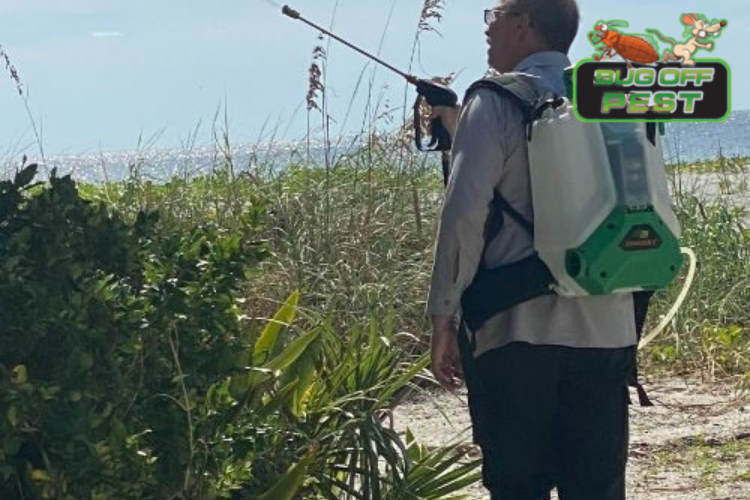Local Port Charlotte Pest Control Service
Local Port Charlotte Pest Control Service
Blog Article
Comprehensive Guide to Recognizing Insect Control Approaches and Their Treatment
Understanding parasite control approaches is essential for effective monitoring of undesirable microorganisms that position risks to health and wellness, agriculture, and property. What variables should be taken into consideration when choosing the suitable pest control method for a particular scenario?
Overview of Insect Control Techniques
Parasite control methods include a selection of techniques developed to handle and get rid of undesirable organisms that can damage human health, farming, and home. Reliable insect monitoring is important for preserving the honesty of ecological communities and making sure the safety and security of food supplies. These techniques can be extensively categorized into three primary strategies: social, mechanical, and biological controls.

Social control entails modifying farming methods or environmental conditions to decrease bug facility and reproduction. Mechanical control relies on physical obstacles or devices to stop insect accessibility or directly eliminate them.
Organic control utilizes all-natural killers, parasites, or pathogens to manage pest populations. This technique highlights environmental balance and can consist of presenting useful insects, such as ladybugs or predative nematodes, to manage bug presence.
Integrated insect management (IPM) incorporates these strategies, making use of a holistic method that highlights avoidance, surveillance, and liable management. By using a blend of these techniques, parasite control can be more sustainable and efficient, reducing dependence on chemical interventions while safeguarding human wellness and the environment.

Chemical Parasite Control Solutions
A variety of chemical pest control solutions are offered, offering effective options for taking care of parasite populaces when various other approaches may fail. These options primarily consist of pesticides, herbicides, fungicides, and rodenticides, each designed to target particular insects while lessening damage to non-target organisms.
Pesticides are particularly reliable against a variety of insects, consisting of ants, roaches, and termites, and can be classified as get in touch with or systemic representatives. Contact insecticides kill parasites on contact, while systemic insecticides are soaked up by plants, making them harmful to pests that feed on them. Herbicides are used to manage unwanted greenery, whereas fungicides are crucial for taking care of fungal conditions that can harm plants and decorative plants.
Rodenticides, made for rodent control, are readily available in different formulations, consisting of lures and tracking powders. It is vital to follow tag guidelines thoroughly to guarantee safety and effectiveness. Additionally, incorporated parasite management (IPM) concepts should be used, combining chemical solutions with cultural, mechanical, and organic approaches for lasting bug control. This all natural strategy not just enhances pest monitoring performance yet likewise decreases potential environmental impacts related to chemical use.
Biological Pest Control Methods
Organic pest control methods supply an environmentally friendly choice to chemical methods by making use of natural killers, parasites, or pathogens to take care of bug populations. This approach leverages the ecological Visit This Link relationships between organisms, advertising a well balanced ecosystem while lessening chemical residue in the environment.
Among one of the most usual biological control approaches includes the introduction of all-natural opponents. For instance, ladybugs are employed to regulate aphid populaces, while parasitic wasps can target caterpillars and other insects. These natural killers efficiently reduce pest numbers without harming useful bugs.
Additionally, microbial representatives such as microorganisms, fungi, and viruses are used to infect and eliminate particular pests. Bacillus thuringiensis (Bt), a normally taking place germs, is extensively made use of to control caterpillars and other larvae, showcasing the performance of microbial bug control.

Physical and Mechanical Methods
Regularly used in incorporated pest management strategies, physical and mechanical methods serve as reliable devices for controlling bug populations without using chemicals. These techniques rely upon physical barriers, catches, and other mechanical tools to avoid or eliminate parasites, making them eco-friendly alternatives.
Physical methods consist of using barriers such as insect netting, screens, or row covers that literally block parasites from accessing plants. This is particularly beneficial in farming setups where crop security is essential. Furthermore, habitat control, such view as removing debris and standing water, can lower bug breeding websites, thus lessening problems.
Mechanical techniques encompass catches, which can be made to catch details pests. Sticky catches and scent traps prevail instances that draw and retain insects, helping with tracking and control. Vacuuming is one more mechanical strategy, efficient for eliminating insects from indoor environments, especially in cases of invasions.
Preventative Parasite Monitoring Methods
Effective preventative parasite administration methods are necessary for preserving healthy and balanced settings and minimizing pest-related problems before they develop (Pest Control in Port Charlotte, FL). These techniques concentrate on positive actions that minimize the possibility of pest infestations by resolving the origin

One more important approach includes correct landscape design practices (Pest Control in Port Charlotte, FL). Maintaining vegetation cut and away from buildings can reduce harborage locations for pests. Executing incorporated bug management (IPM) strategies that include checking bug populations and using biological controls can cultivate a balanced ecosystem that normally subdues pest numbers.
Education and learning and training for staff and citizens on identifying early indications of parasite task are also crucial parts of an effective preventative program. By promoting an atmosphere of recognition and alertness, companies and homeowners can considerably boost their pest administration initiatives and guard their rooms versus future problems.
Final Thought
Using an Integrated Pest Management (IPM) structure enables for the sustainable management of parasites while decreasing ecological influence. Eventually, a complete understanding of these diverse pest control strategies is important for achieving effective results in insect management campaigns.
Report this page